There is an art to fishing, and Jesus demonstrated the nuances of that skill when He called Peter and Andrew to follow Him. John Chrysostom (Matthew, homily 14) explains...
"And walking by the sea of Galilee, He saw two brethren, Simon that was surnamed Peter, and Andrew his brother, casting a net into the sea; for they were fishers. And He says unto them, 'Come ye after me, and I will make you fishers of men.' And they left their nets, and followed Him." (Matthew 4:18-19)
And yet John says that they were called in another manner. Whence it is evident that this was a second call; and from many things one may perceive this. For there it is said, that they came to Him whenJohn was not yet cast into prison;but here, after he was in confinement. And there Andrew calls Peter, but here Jesus calls both.And John says, Jesus seeing Simon coming, says,
You are Simon, the Son of Jona, you shall be called Cephas, which is by interpretation, a stone.(John 1:42)
But Matthew says that he was already called by that name; for his words are,Seeing Simon that was called Peter.And from the place whence they were called, and from many other things, one may perceive this; and from their ready obedience, and abandonment of all. For now they were well instructed beforehand. Thus, in the other case, Andrew is seen coming into His house, and hearing many things; but here, having heard one bare word, they followed immediately. Since neither was it unnatural for them to follow Him at the beginning, and then leave Him again and return anew to their own craft, when they saw both John thrown into prison, and Himself departing. Accordingly you see that He finds them actually fishing. But He neither forbad them at the first when minded to withdraw, nor having withdrawn themselves, did He let them go altogether; but He gave way when they started aside from Him, and comes again to win them back; which kind of thing is the great point in fishing.

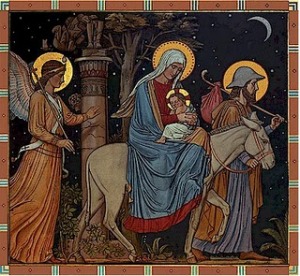
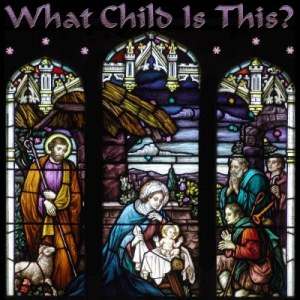

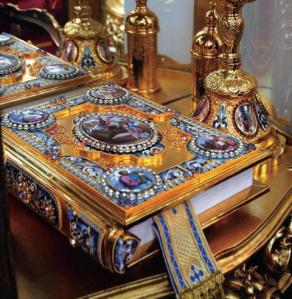
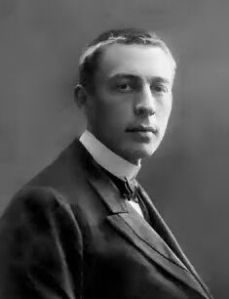
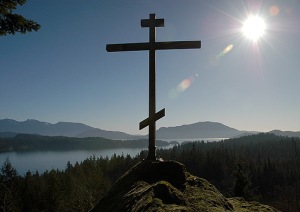

 things of life through the sensible faculty as if by a nail, it is hard to turn away from them. It has grown up together with these attachments much in the same way as the shellfish and snails are bound to their covering of clay; and so it is slow to make such movements, since it drags along the whole burden of a lifetime. As such is its condition, the soul is easily captured by its persecutors with the threat of confiscation of property or loss of sonic other things that are coveted in this life; and so it gives in easily, and yields to the power of its persecutor.
things of life through the sensible faculty as if by a nail, it is hard to turn away from them. It has grown up together with these attachments much in the same way as the shellfish and snails are bound to their covering of clay; and so it is slow to make such movements, since it drags along the whole burden of a lifetime. As such is its condition, the soul is easily captured by its persecutors with the threat of confiscation of property or loss of sonic other things that are coveted in this life; and so it gives in easily, and yields to the power of its persecutor.

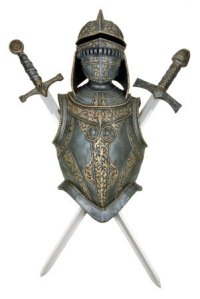 lain to any one that he will. Yet not on account of the weakness of the weapons, but on account of the unskillfulness of the man who knows not how to use them well.
lain to any one that he will. Yet not on account of the weakness of the weapons, but on account of the unskillfulness of the man who knows not how to use them well. ission of faith? Nicodemus heard of the spiritual Birth, yet perceived it not as spiritual, but dragged down the words to the lowness of the flesh, and made a doctrine so great and high depend upon physical consequence. And so he invents frivolities, and ridiculous difficulties.
ission of faith? Nicodemus heard of the spiritual Birth, yet perceived it not as spiritual, but dragged down the words to the lowness of the flesh, and made a doctrine so great and high depend upon physical consequence. And so he invents frivolities, and ridiculous difficulties.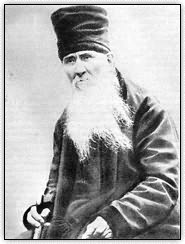 ther, and its yearly confessional which is often hypocritical, only increases its patches rather than rejuvenating it. The body demands various forms of diversions and gratifications; it frequently ravages whole families, for its sake people sometimes are willing to exert all types of efforts while the soul - has barely one hour on Sundays to partake in the Divine Liturgy, scarcely minutes for morning and evening prayers, reluctantly collects a handful of copper coins for charity and when thinking about death, expresses its satisfaction with a cold sigh. For the sake of health and welfare of the body, the atmosphere and habitat is substituted, foremost and distant physicians are summoned, there is abstinence from food and drink, the most bitter medicines are consumed, the body is allowed to be burned and dissected, yet for the health of the soul, for the avoidance of temptations, for distancing away from sinful infection, they take not one step but remain in the same atmosphere, in the same iniquitous society, in the same corrupt house, not seeking any spiritual physician, or else selecting one that is unfamiliar and inexperienced, hiding from him that which is already known to Heaven and hell, and about which they themselves boast among their circles. When the body is dying, you hear lamentations and despair, but often no thought is given when the soul is dying from mortal sin.
ther, and its yearly confessional which is often hypocritical, only increases its patches rather than rejuvenating it. The body demands various forms of diversions and gratifications; it frequently ravages whole families, for its sake people sometimes are willing to exert all types of efforts while the soul - has barely one hour on Sundays to partake in the Divine Liturgy, scarcely minutes for morning and evening prayers, reluctantly collects a handful of copper coins for charity and when thinking about death, expresses its satisfaction with a cold sigh. For the sake of health and welfare of the body, the atmosphere and habitat is substituted, foremost and distant physicians are summoned, there is abstinence from food and drink, the most bitter medicines are consumed, the body is allowed to be burned and dissected, yet for the health of the soul, for the avoidance of temptations, for distancing away from sinful infection, they take not one step but remain in the same atmosphere, in the same iniquitous society, in the same corrupt house, not seeking any spiritual physician, or else selecting one that is unfamiliar and inexperienced, hiding from him that which is already known to Heaven and hell, and about which they themselves boast among their circles. When the body is dying, you hear lamentations and despair, but often no thought is given when the soul is dying from mortal sin.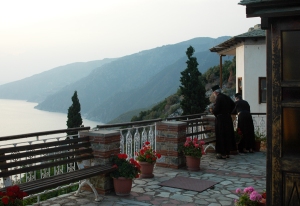 ying during that very moment. Then, he wondered what the Holy Mountain looked like under such intensive prayer.
ying during that very moment. Then, he wondered what the Holy Mountain looked like under such intensive prayer.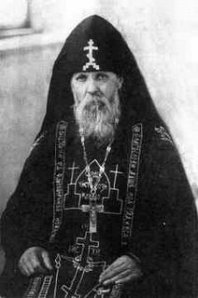 s from Me. For I have your material means at my disposal. I want you to call unto me, for you to be dependent upon Me. My reserves are inexhaustible. I want you to be confirmed in fidelity to Me and to My promises. May it not be said to you in your need: You did not believe in the Lord your God.
s from Me. For I have your material means at my disposal. I want you to call unto me, for you to be dependent upon Me. My reserves are inexhaustible. I want you to be confirmed in fidelity to Me and to My promises. May it not be said to you in your need: You did not believe in the Lord your God.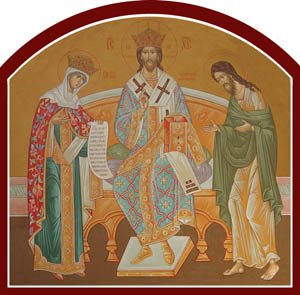 ning John:
ning John:  ur resources, our abilities, our accomplishments and those of other people. We desperately want things to be "fair" - of course, as we define fairness. We cannot imagine that there could be any good, any advantage, any ultimate purpose achieved by inequality. But life is different lived in the Kingdom of God.
ur resources, our abilities, our accomplishments and those of other people. We desperately want things to be "fair" - of course, as we define fairness. We cannot imagine that there could be any good, any advantage, any ultimate purpose achieved by inequality. But life is different lived in the Kingdom of God.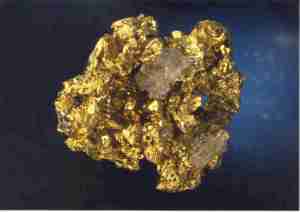 n these, maimed in body, and suffering from ten thousand ills.
n these, maimed in body, and suffering from ten thousand ills. I am currently reading some of the
I am currently reading some of the 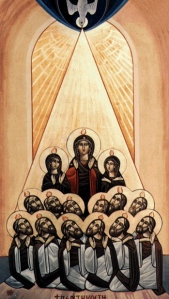
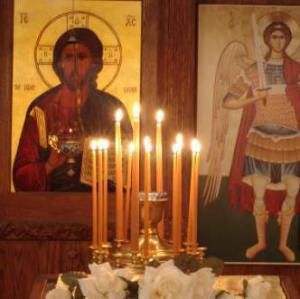 rs of the Church, they have become more and more dear and personal to me. On Sunday morning, we join with all the saints – past and present – in worshiping the Holy Trinity.
rs of the Church, they have become more and more dear and personal to me. On Sunday morning, we join with all the saints – past and present – in worshiping the Holy Trinity.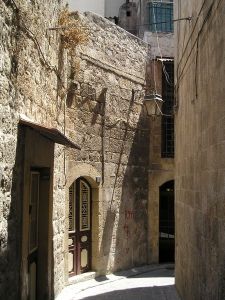
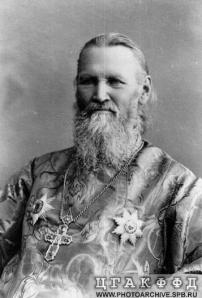 ience to the Lord; from the prophets and apostles, the zeal for God' s glory and for the salvation of the souls of men; from the hierarchs, zeal to preach God's word, and in general to assist through the Scriptures, to the possible glorification of God's name, to the strengthening 'of faith, hope, and love amongst Christians; from the martyrs and confessors, firmness for the faith and piety before unbelieving and godless people; from the ascetics, to crucify your own flesh, with its passions and desires, to pray and think piously; and from the unmercenary, not to love gain, and to give gratuitous help to the needy. - My Life in Christ
ience to the Lord; from the prophets and apostles, the zeal for God' s glory and for the salvation of the souls of men; from the hierarchs, zeal to preach God's word, and in general to assist through the Scriptures, to the possible glorification of God's name, to the strengthening 'of faith, hope, and love amongst Christians; from the martyrs and confessors, firmness for the faith and piety before unbelieving and godless people; from the ascetics, to crucify your own flesh, with its passions and desires, to pray and think piously; and from the unmercenary, not to love gain, and to give gratuitous help to the needy. - My Life in Christ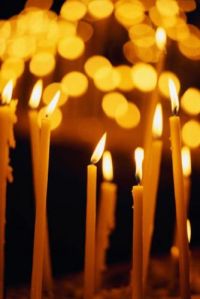 s and the good gives us new breath because we are always aware that everything is more than it is. The family is not just a routine relationship; it is our sanctification. Work is not just a job; it is our exercise in miracle making. Prayer is not just quiet time; it is an invitation to grow. We begin to find God where we could not see God before, not as a panacea or an anesthetic, not as a cheap release from the problems of life, but as another measure of life's meaning for us.
s and the good gives us new breath because we are always aware that everything is more than it is. The family is not just a routine relationship; it is our sanctification. Work is not just a job; it is our exercise in miracle making. Prayer is not just quiet time; it is an invitation to grow. We begin to find God where we could not see God before, not as a panacea or an anesthetic, not as a cheap release from the problems of life, but as another measure of life's meaning for us.